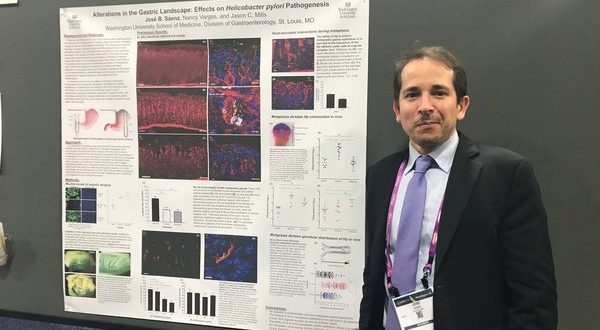Foundation-Funded Research Scholar Receives NIH Grant to Continue Research
Jose Saenz, the 2017 recipient of the AGA–Gastric Cancer Foundation Ben Feinstein Memorial Research Scholar Award in Gastric Cancer, has taken a major step forward in his efforts to unravel the mysteries of the Helicobacter pylori (H. pylori) bacterium, a huge risk factor for developing stomach cancer.
In September, Saenz was awarded a five-year grant from the National Institutes of Health to fund his H. pylori research. The grant, worth $159,558 the first year alone, will allow him to build upon recent insights he has gained into how the bacterium spreads and survives in the stomach.
“This will really help me fund a critical period as a physician-scientist transitioning out of a training environment and building towards independence,” says Saenz, an instructor in the division of gastroenterology at Washington University School of Medicine. The five years of funding will allow Saenz to extend his research beyond the conclusion of GCF’s three-year grant, which he believes will set him up for even bigger research grants in the future.
GCF’s funding supported two key research publications over the past year that were led by Saenz, including a paper in the journal Gastroenterology. The study explained how H. pylori exploits changes in the stomach environment, such as a decrease in acid, to expand its colonization of the organ.
“We found that when we changed the stomach environment, we could change where H. pylori went throughout the stomach,” Saenz says. “That has implications for people who are chronically infected with H. pylori and start to develop inflammation in their stomach. H. pylori finds ways to adapt to the changes and take advantage of them.”
With further research, it may someday be possible to improve early detection of gastric cancer by determining who faces the highest risk, Saenz says. “I want to understand how H. pylori is adapting genetically to different regions or environmental conditions in the stomach,” he says. “The idea would be that if a patient comes in infected with H. pylori, we can use genetic markers specific to H. pylori to determine if that patient is at an increased risk of developing gastric cancer.”
Saenz also authored a literature review in the journal Nature Reviews Gastroenterology & Hepatology, concluding that the stomach has a remarkable ability to respond to injury. “The stomach is an incredibly plastic organ. We think multiple cells in the stomach have the capacity, under different conditions, to heed the call for repair,” he says.
Saenz is now focusing on studying a pathway called the double-stranded RNA response, which he believes plays a major role in how the stomach repairs itself.
The AGA-GCF research scholar award was critical for Saenz to make it to this point, he says. “I was able to hire a research assistant and double my productivity,” he says. “That allowed me to really expand my ideas and develop them. These were the experiments that helped me win the NIH award.”

